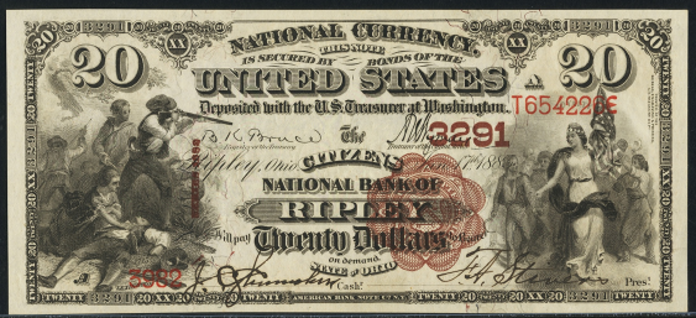Twenty Dollar Notes › Nationals › 1882 Twenty Dollar National Bank Notes › Kansas Charters › 1882 $20 Sterling Kansas First National Bank
Get Value Now
| Item | Info |
|---|---|
| Series | 1882 |
| Charter | #3207 First National Bank of Sterling, Kansas |
| Year Chartered | 1884, 180 Banks Chartered |
| City Info | Sterling is a city in Rice County, Kansas, United States. As of the 2010 census, the city population was 2,328. Sterling is home to Sterling College. For millennia, the land now known as Kansas was inhabited by Native Americans. In 1803, most of modern Kansas was secured by the United States as part of the Louisiana Purchase. In 1854, the Kansas Territory was organized, then in 1861 Kansas became the 34th U.S. state. In 1867, Rice County was founded. Source: Wikipedia |
| Similar Cities | If your note doesn't match try: 1. Sterling, Illinois - First National Bank 2. Mount Sterling, Kentucky - Mount Sterling National Bank 3. Mount Sterling, Kentucky - Farmers National Bank 4. Mount Sterling, Illinois - First National Bank 5. Sterling, Illinois - Sterling National Bank 6. Sterling, Nebraska - First National Bank 7. Mount Sterling, Ohio - First National Bank 8. Sterling, Colorado - First National Bank |
| Seal Varieties | Brown, Blue |
| See Also | If your note doesn't match try: 1. 1882 $20 Gold Certificate 2. 1878 $20 Legal Tender 3. 1880 $20 Legal Tender |
| Other Info | 1. Value depends on notes known for charter, condition and market demand. |
| Neat Fact | Value Backs issued in sheets of 4 Notes: 3 $10 Notes, 1 $20 Note. Less commonly 4 $10 Notes (Friedbergs, 20th Ed. P122) |
No Obligations Offers and Appraisals
Please submit a good photo or scan. It will be identified and evaluated. Understand there may be subtle differences between the image you see above and your note. Signatures, design, markings and note condition will determine the offer price. Notes in Uncirculated or better condition receive the best offers.
Appraisals can be estimated for wholesale and retail prices. Wholesale is what dealers typically pay. Retail is what a collector might pay. Retail is slightly higher in most cases.
Please visit this page for USA Paper Money Reference. Do not treat this page as a reference guide, it is for appraisal and acquisition purposes only.
